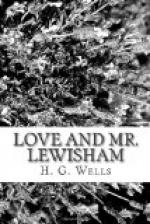Ages passed.
Lewisham suddenly found himself being shown a photograph under a lamp. It represented an unsymmetrical face singularly void of expression, the upper part of an “art” dress, and a fringe of curls. He perceived he was being given to understand that this was a Paragon of Purity, and that she was the particular property of Parkson. Parkson was regarding him proudly, and apparently awaiting his verdict.
Lewisham struggled with the truth. “It’s an interesting face,” he said.
“It is a face essentially beautiful,” said Parkson quietly but firmly. “Do you notice the eyes, Lewisham?”
“Oh yes,” said Lewisham. “Yes. I see the eyes.”
“They are ... innocent. They are the eyes of a little child.”
“Yes. They look that sort of eye. Very nice, old man. I congratulate you. Where does she live?”
“You never saw a face like that in London,” said Parkson.
“Never,” said Lewisham decisively.
“I would not show that to every one,” said Parkson. “You can scarcely judge all that pure-hearted, wonderful girl is to me.” He returned the photograph solemnly to its envelope, regarding Lewisham with an air of one who has performed the ceremony of blood-brotherhood. Then taking Lewisham’s arm affectionately—a thing Lewisham detested—he went on to a copious outpouring on Love—with illustrative anecdotes of the Paragon. It was just sufficiently cognate to the matter of Lewisham’s thoughts to demand attention. Every now and then he had to answer, and he felt an idiotic desire—albeit he clearly perceived its idiocy—to reciprocate confidences. The necessity of fleeing Parkson became urgent—Lewisham’s temper under these multitudinous stresses was going.
“Every man needs a Lode Star,” said Parkson—and Lewisham swore under his breath.
Parkson’s lodgings were now near at hand to the left, and it occurred to him this boredom would be soonest ended if he took Parkson home, Parkson consented mechanically, still discoursing.
“I have often seen you talking to Miss Heydinger,” he said. “If you will pardon my saying it ...”
“We are excellent friends,” admitted Lewisham. “But here we are at your diggings.”
Parkson stared at his “diggings.” “There’s Heaps I want to talk about. I’ll come part of the way at any rate to Battersea. Your Miss Heydinger, I was saying ...”
From that point onwards he made casual appeals to a supposed confidence between Lewisham and Miss Heydinger, each of which increased Lewisham’s exasperation. “It will not be long before you also, Lewisham, will begin to know the infinite purification of a Pure Love....” Then suddenly, with a vague idea of suppressing Parkson’s unendurable chatter, as one motive at least, Lewisham rushed into the confidential.
“I know,” he said. “You talk to me as though ... I’ve marked out my destiny these three years.” His confidential impulse died as he relieved it.




